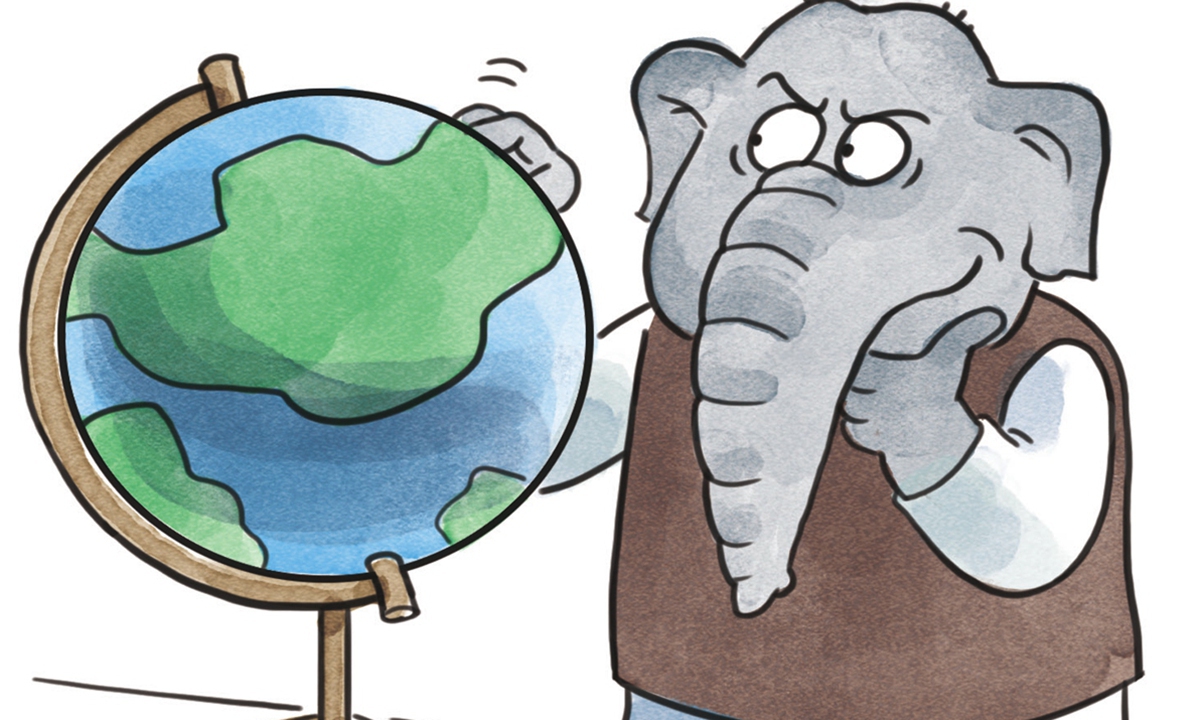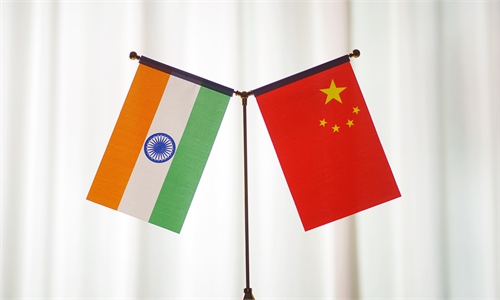Indian High Commission’s attitude a sign of narrow-minded, nationalistic thinking

India Illustration: Liu Rui/GT
A recent article by Chinese Ambassador to Sri Lanka Qi Zhenhong has touched New Delhi on its sore spot. The reaction of the Indian High Commission in Sri Lanka to Qi's article once again shows India's sense of insecurity in the face of the growing ties between China and other South Asian countries.
In his Friday article, Qi praised China and Sri Lanka for "jointly safeguarding each other's sovereignty, independence, and territorial integrity" by linking Colombo's final decision to allow China's research vessel?Yuan Wang 5?to dock at the Hambantota Port with China's firm countermeasures after some US politicians' provocations in the Taiwan Straits.
In response, the Indian High Commission in Sri Lanka on Saturday bashed on Twitter Qi's remarks as a "violation of basic diplomatic etiquette." The High Commission also said Sri Lanka needs support, not "unwanted pressure or unnecessary controversies to serve another country's agenda," implying China is putting pressure on the island country deep in trouble.
It is impossible that Qi made such statements to sow discord between India and Sri Lanka, or to provoke India intentionally. The article clearly focuses on how Beijing and Colombo maintained sovereignty and independence amid external interference, the importance of which India surely understands as an independent and sovereign country iteself. But why did India act as if it were hurt badly?
In the Chinese ambassador's article, what could cause such a strong reaction from India are such phrases, including how Sri Lanka overcame "aggression from its northern neighbor 17 times" and how China and Sri Lanka resisted "the rude and unreasonable interference from third parties" over?Yuan Wang 5. Ironically, these simple facts have the power to make some Indian politicians furious, only proving how fragile they are. As a result, New Delhi chose to turn a blind eye to the real concern of Qi's statement and try to draw fire to China-Sri Lanka relations as a way to hide their fragile heart.
The Beijing-Colombo ties have long been a target of vicious assumptions from external forces, including India. From the two countries' cooperation in the Belt and Road Initiative portrayed as China setting a "debt trap" on Sri Lanka to the argument that Beijing abandoned Colombo after the crisis emerged in the island country, some voices would miss no opportunity to make China-Sri Lanka relations seem like "a bully versus its victim." Through smears, New Delhi plays down the cooperation between the two sides, preventing it to develop further.
However, whether or not to develop bilateral relations is not a one-way decision, but a two-way choice. Moreover, the cooperation is carried out on an equal footing, aiming at and seeking mutual benefits. The accusations against China's intention in its cooperation with Sri Lanka - for instance, stating the former is using the latter "as a pawn in a bigger game" - are full of malice in a geopolitical game against Beijing.
Take the recent controversy over?Yuan Wang 5. It is commonplace for vessels from one country to dock at another one's port for resupply. If New Delhi truly cares about its neighbors as it has claimed, it should have supported Colombo's rights to be independent and make decisions in favor of its economic interests. But it doesn't. India has decided to politicize this matter, as it strongly opposed the docking of the Chinese ship out of "security concerns." It is obvious which country is using Colombo as a chess piece.
Over the years, India has been attempting to consolidate its sphere of influence in South Asia. Therefore, it has to adopt an exclusive strategy diplomatically and a coercive strategy economically toward regional countries. As India treats some South Asian countries as its own vassal states, it doesn't allow them to maintain a good relationship with China, said Song Zhongping, a Beijing-based military expert and TV commentator.
"The reaction of the Indian High Commission demonstrates their narrow-minded, nationalistic thinking, which also seriously hinders the development of China-India ties," Song continued.
Facing a serious economic crisis and civil unrest, Sri Lanka needs help and support from the international community. And although there is friction between China and India, they are far from being rivals, let alone enemies. Therefore, New Delhi should not regard Colombo as a tool in its geopolitical game and exploit the current crisis to satisfy its geopolitical ambitions in the South Asian region.
In particular, India needs to stop taking a different position against China for the sake of it, using its oversensitive mentality to maliciously speculate on China, and adopting expansionist measures to maintain its dominance in South Asia and exclude the presence of non-regional countries. Cooperation and dialogue within the global community are needed now. If China and India can work together to find solutions to help Sri Lanka, this will help the country out of trouble as early as possible.


